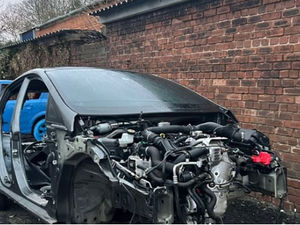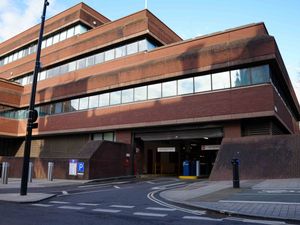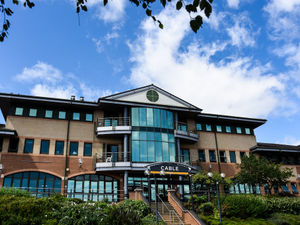PICTURED: Shocking scenes as 40 Romanians found crammed into three bedroom Black Country house
Police found 40 Romanians living in a three bedroom house with ten more at another property nearby, sparking an anti-slavery investigation, police revealed today.

The shocking discovery came when officers launched an early morning raid at the address on a road close to a Black Country high street.
The 4.30am swoop followed a tip that a large number of Eastern European men regularly seen hanging around the area could be victims of 21st Century slavery.
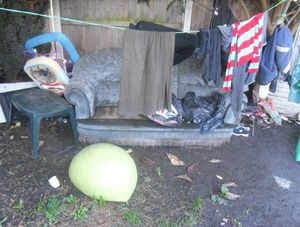
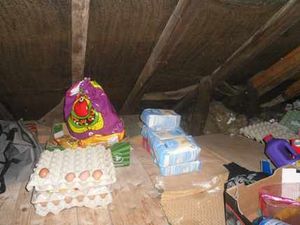
Police Sergeant Marc Butler - among West Midlands police officers who took part in the operation alongside members of the National Crime Agency, Red Cross staff, the slavery charity Hope for Justice, interpreters and housing officials - said: "In one three-bed property we found 40 people.
"There was not a patch of floor without a makeshift bed. There was little or no furniture in the rooms - just people."


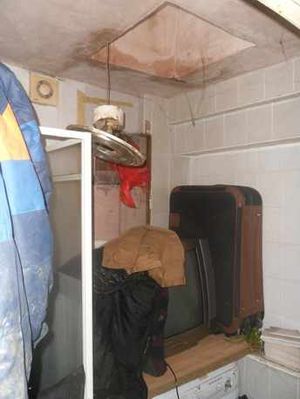

The hallway and even the bathroom and toilet were packed with sleeping figures.
The kitchen had a cooker but nothing else except mattresses.
There were unprotected electric wires under the stairs, damp stains pock-marked ceilings while the back garden was littered with dumped mattresses, clothes, chairs, toys and even a computer tower. The loft had become a makeshift larder.
The 50 Romanians, including six children - the youngest of whom was just 18 months old - and eight women, were taken to a reception centre where they were given food and clothing.
They were kept apart from three men believed to have been running the two houses in the hope this would allow them to talk more freely about their plight.
A 23-year-old man was quizzed by investigators from the Gangmasters Licensing Authority on suspicion of pocketing wages earned by the the men and women. Documentation linking the people to a farm in Worcestershire was seized for further inquiries.
The women and children were rehoused by the local authority but the men declined offers of support following the raid late last month. They told police they would look for alternative accommodation themselves and declined further assistance.
Some vowed to catch the coach back to Romania although it remains unclear if they did. Several claimed to have been in the UK for just three weeks while others said they had been in the country for months.
Sgt Butler explained: "The fire service said it was a disaster waiting to happen and a prohibition notice was served effectively closing the house down until it is made safe.
"On this occasion no offences were disclosed to officers."
But in a separate operation five Polish nationals have been arrested on suspicion of being part of an organised trafficking gang bringing people from their home country to the West Midlands with false promises of well-paid work.
Men aged 22, 26, 39 and 49, plus a 44-year-old woman, remain on police bail while detectives investigate claims made by around 30 people that they were worked as slaves and threatened with violence. It is believed that the gang may have exploited up to 100 people over the last two years.
Police are now trying to slap Slavery and Trafficking Risk Orders on the suspects banning them from both arranging travel to the UK for other people and fixing accommodation, work or bank accounts for third parties. They would also be forced to let officers know if they move address.
Detective Inspector Nick Dale, from West Midlands Police 'slavery squad' explained: "Such operations are challenging as we regularly come up against victims who have been brainwashed by traffickers into thinking police will prosecute them.
"They may have misplaced loyalty, 'debt bondage' to traffickers, or a general fear of reprisals should they speak out against their treatment. It is crucial for us to gain the trust and co-operation of victims."
Detective Chief Inspector Tom Chisholm, West Midlands Police slavery expert, said: "We mostly encounter Eastern European men subjected to forced labour in construction or agriculture. We have a steady stream of people turning up at police stations, some displaying injuries, reporting to have escaped slave-masters or been dumped in the street when work dries up.
"Invariably they will have been approached in their home country with offers of attractive salaries working in the UK and agreements are usually made to sacrifice part of their wages in return for accommodation, transport and living expenses.
"On arrival they are sent to work, paid far less than promised, charged exorbitant rents, and threatened with violence if they protest or try to leave. "
In the first three months of this year West Midlands Police referred 27 suspected slavery victims to the UK Human Trafficking Centre – only 10 less than the whole of 2014 – and, if they decide the cases are worth pursuing, detectives, working with the Salvation Army, will ensure the victims are put in temporary accommodation outside the region while investigations continue.

